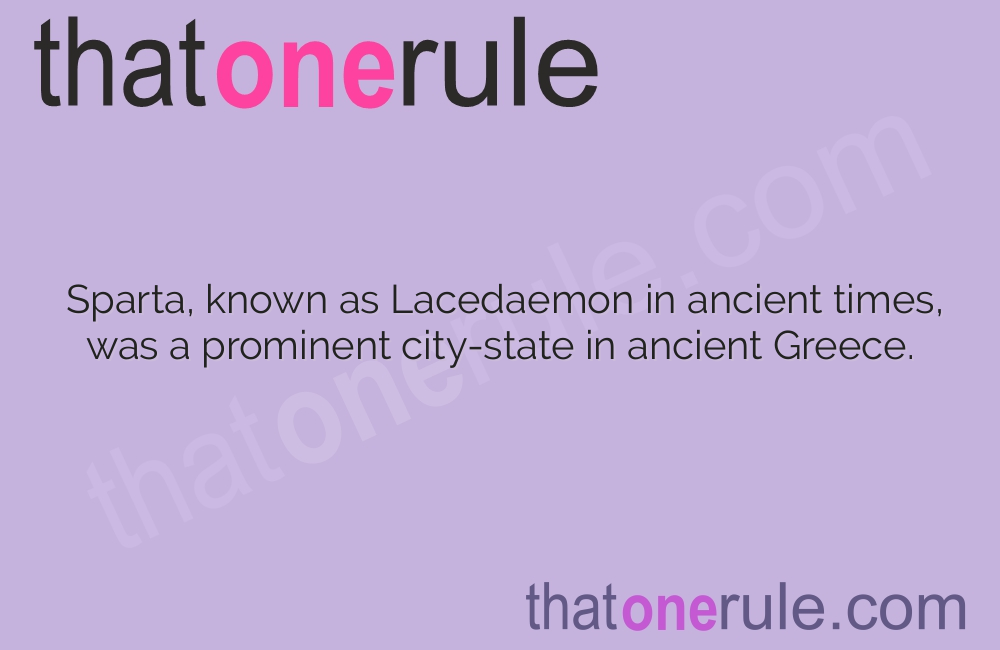Facts about Sparta – Unveiling the Enigmatic City-State’s History and Culture

Sparta, known as Lacedaemon in ancient times, was a prominent city-state in ancient Greece.
Sparta was located in the southern region of the Peloponnese peninsula.
The Spartans were known for their strict military society and fierce warriors.
Spartans believed in training their citizens from a young age to become skilled soldiers.
The Spartan military system, known as the Agoge, aimed to produce disciplined and fearless warriors.
Women in Sparta had more rights and freedom compared to other ancient Greek city-states.
Spartan women were encouraged to engage in physical activities and sports to raise strong and healthy children.
The Spartan government was organized as an oligarchy, with two kings ruling in tandem.
Sparta was famous for its elite warriors called the Spartan hoplites, known for their distinctive red-cloaked uniforms.
Spartans were known for their discipline, endurance, and bravery on the battlefield.
Spartan society emphasized military training and excellence over intellectual and artistic pursuits.
Spartans followed an austere lifestyle, with a focus on physical fitness and discipline.
Sparta was often at odds with its rival city-state, Athens, during the Peloponnesian War.
Spartan society valued collectivism and discouraged individualism.
Spartan children were often tested for their strength and endurance at birth, and those deemed weak were left to die.
Spartan women were encouraged to marry and bear children for the state, rather than for personal reasons.
Facts about Sparta – Unveiling the Enigmatic City-State’s History and Culture part 2
Spartans focused on military tactics and strategy rather than naval superiority like their Athenian counterparts.
The Battle of Thermopylae, where a small Spartan force faced off against the massive Persian army, is one of the most famous events in Spartan history.
Sparta’s economy was heavily reliant on slave labor, with enslaved people known as helots.
The helots greatly outnumbered the Spartan citizens but were kept in check through a system of mandatory military service.
The Spartans had a unique form of government called the Gerousia, which consisted of 28 male elders.
Spartan boys were taken away from their families at the age of seven to begin their military training.
Spartan girls received physical education and were trained in combat alongside their brothers.
Spartan warriors were highly respected by the ancient Greeks for their military prowess.
Sparta experienced decline and loss of power after its defeat to Thebes in the Battle of Leuctra.
Spartan poetry and literature focused on themes of war and military valor.
Spartan soldiers were recognized by their iconic bronze helmets, greaves, and round shields.
The Spartans had a reputation for their strict social and cultural customs, known as the Lycurgic system.
Spartan society placed a high value on self-control and discipline.
Sparta’s military strength was rooted in its citizen-soldier model, where all citizens were prepared for war at any given time.
Spartan men were expected to marry at the age of 20, but they still lived in the barracks until the age of
Sparta’s military dominance led to it becoming a major player in the Peloponnesian League, a coalition of city-states in Greece.
Spartan women had more personal and financial freedom than most ancient Greek women.
Spartans were known for their simple and plain lifestyle, rejecting luxury and extravagance.
The Spartan military consisted of heavy infantry known as hoplites, armed with long spears and round shields.
Spartans were known for their unwavering loyalty to their comrades and the state.
Spartan names often had military associations, reflecting the importance of martial virtues in their society.
Sparta was a militaristic society, with constant training and drills being a part of daily life.
Spartan soldiers were expected to be fearless in battle, as retreat or surrender was considered dishonorable.
The Spartan phalanx, a military formation where soldiers locked their shields together, was highly effective in combat.
Sparta’s warrior culture inspired later military societies, such as the Roman Empire.
The decline of Spartan power can be attributed to internal conflicts and lack of adaptation to changing warfare tactics.
Spartan women had more influence in society compared to other Greek women, and they could own property.
Spartans were known for their stoic demeanor and lack of emotion, as they believed it made them better warriors.
The bravery of the Spartans at the Battle of Thermopylae has inspired numerous books, movies, and legends.